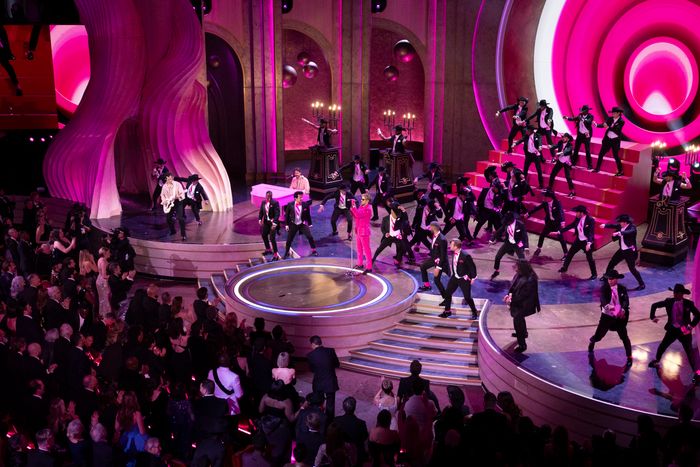
Like Lady Gaga and Bradley Cooper before him, Ryan Gosling started his Oscar song from the audience of the Dolby Theatre before heading onto the stage. For the leads of A Star Is Born, the reverse-proscenium break was the culmination of a season-long campaign to blur the lines between the characters in the romantic drama and the people playing them, but no one has ever been in danger of confusing Gosling with a smooth-crotched Mattel doll. When the actor poked his head out from behind an already giggling Margot Robbie to sing the opening strains of “I’m Just Ken,” the only aims were for him to put on a show and to enlist the crowd to join him. The song might have been silly, but the performance was all commitment, with Gosling showing off those impressive, Mickey Mouse Club–honed pipes and getting hoisted into the air for a Busby Berkeley overhead shot in which he was surrounded by a swirl of classic Barbie heads. Fellow Kens Kingsley Ben-Adir, Scott Evans, Ncuti Gatwa, and Simu Liu joined him, Slash joined him, and eventually his director Greta Gerwig and co-stars America Ferrera and Robbie joined him as he went back into the audience with his mic to make the last part of the number a sing-along. It was delightful, which shouldn’t have been a surprise. After all, these people are professionals.
The 96th Academy Awards was a three-and-a-half-hour reminder that Hollywood is actually good at this — at putting on the charm, at entertaining, and at allowing itself to be larger than life and self-interested. It was a pleasing spectacle that also felt chastened, as though after years of treating the awards show as a guaranteed platform, everyone involved realized they also needed to give viewers a reason to tune in. The earlier start time was a blessed concession to the folks at home, who finished with enough of the evening left that they might have even had the energy to watch a synergistic new episode of Abbott Elementary afterward. The inward-looking nature of the ceremony also felt like a strategic retrenchment. The Oscars have always had a complicated relationship with the off-screen world, preferring vague statements on behalf of causes and politely applauded historic milestones over anything that might verge on the uncomfortable. But this year, even those barely came up. When host Jimmy Kimmel, whose material ranged from the mild to the innocuous (the riskiest he got were some Madame Web punch lines), brought up what a “tough year” it had been, he was referring only to the strike, and while his subsequent tribute to the Teamsters and to labor was lovely, it was hard not to also take note of the awards show’s narrowing lens.
Hollywood’s been going through an era of contraction — in terms of work literally being disappeared off streaming servers, as well as in terms of relevance, with the world’s increasingly fractured attention funneling off to online platforms. So it’s no wonder that, with two auteurist blockbusters to celebrate and wounds to lick, the industry took this opportunity to tend to itself and to occasionally attempt to save itself as well. American Fiction writer-director Cord Jefferson called the industry “risk-averse” and proposed that “instead of making one $200 million movie, try making 20 $10 million movies. Or 50 $4 million movies.” Oppenheimer cinematographer Hoyte van Hoytema suggested people try shooting on celluloid: “It’s much easier than you think and it makes things look so much better.” In resurrecting the tradition of having previous winners introduce the acting categories, the ceremony found an excruciating mix of the poignant and the calculated, with some past winners saluting friends on a personal level and others delivering generic platitudes to total strangers. The most sincere tributes instead came from Da’Vine Joy Randolph tearfully thanking her publicist and Robert Downey Jr. saluting the entertainment lawyer who spent decades “trying to get me insured and bailing me out.”
The best jokes of the night were backwards-looking. The reliably game John Cena shuffled out in a flesh-toned modesty pouch and a strategically placed awards envelope, his body looking more Ken-like than any actor in Barbie, for an inspired bit of physical comedy pegged to the 1974 Oscar streaking incident. Twins co-stars Danny DeVito and Arnold Schwarzenegger came out to bond, wonderfully, over both having been defeated by Batman onscreen, with a pitch-perfect Michael Keaton making bring-it-on motions from the audience. When your industry’s been put on the back foot, you reach for the familiar and the tried and true, and if there’s a sense of disconnect between what’s onstage and the outside world, well, Hollywood’s always declared itself the kingdom of dreams. Reuters provided a livestream of the pro-Palestine protesters outside the theater who blocked traffic and held aloft signs with messaging like, “What good is art that ignores genocide,” and, if you chose, you could watch it alongside the ceremony, where Gaza went mentioned only by The Zone of Interest’s Jonathan Glazer, though other attendees wore red cease-fire pins. When Kimmel mentioned Donald Trump’s critical post about the Oscars toward the end of the night, asking, “Isn’t it past your jail time?” after thanking him for watching, even that eruption of the outside into the gleaming confines of the theater felt like it had less to do with politics than with that inescapable burden of being in entertainment: the bad review. If Gosling was just Ken as he charmed the pants off everyone watching in that pink suit, Hollywood tried to strike the same attitude at its annual showcase of itself. The movies — sometimes they mean everything, and sometimes, when it’s more convenient, they’re just for fun.
More on the Oscars
- Every Oscar Best Picture Winner, Ranked
- 10 Things Sona Movsesian Could Do at the Oscars
- The Evolutions of Emma Stone


